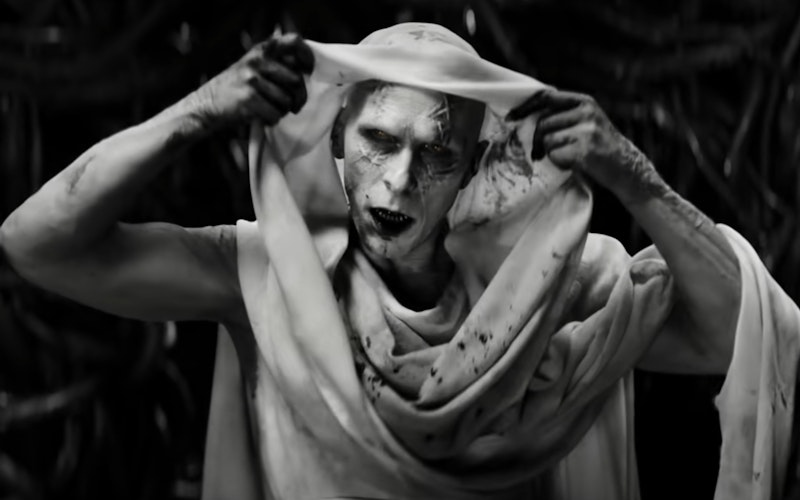
Movies
Thor, Gorr, and Grace
Phase Four of the Marvel Cinematic Universe exists in the backdrop of Avengers: Endgame's trauma, with the franchise's characters responding in different ways. The grief of Wanda (Elizabeth Olsen) leads her to become a villain (again). Sam Wilson (Anthony Mackie) resists seeing his “mentor” replaced, but later embraces the mantle of Captain America, standing against racism and division. Spidey (Tom Holland) dives deeper into being a full-time hero, yet loses people close to him. This all sets the stage for Thor: Love and Thunder, where trauma takes the leading role, with the power to suck away life and isolate people from love.
Interestingly, the film does not open with its title hero. Instead, we are introduced to Gorr the God Butcher, who is the epitome of trauma. Played very menacingly by Christian Bale (more Christian Bale villain movies please), Gorr suffers in a barren land. He and his daughter are the only beings left alive, but they are dying. He prays to the sun deity Rapu (Jonny Brugh) for help, yet his daughter still dies. While sprawled across her grave, what appears to be a utopia in the middle of the desert appears before him. It is flourishing with life: a flowing stream, a shady jungle, and ripe, delicious fruit. At the center sits Rapu, the very god to whom Gorr has been praying. But Gorr’s joy soon turns to grief when he learns that Rapu is not concerned with his well-being. In fact, while Gorr and his people were suffering, Rapu was having a party to celebrate a recent battle victory. As Gorr confronts Rapu about his lack of care, the mythical Necrosword—capable of killing divine beings—presents itself to Gorr. He slays Rapu with it and makes a vow of vengeance: “All gods will die.”
Gorr was a devout follower who lost everything but his own life, echoing Job of the Bible. He’s even shown as selfless, as his prayer is for his daughter’s sake and not his own. Yet his faith in an uncaring god cannot spare him from trauma. His purpose, then, becomes to kill all gods for allowing such trauma to exist in the universe, thereby making trauma the true “god butcher” of the story.
If we aren’t careful, we can also fall victim to our own pit of suffering and loneliness in the wake of trauma. Trauma surrounds us. We’re living in a “somewhat” post-pandemic world that feels eerily similar to a plague. World hunger is a massive yet seemingly solvable problem, if it wasn’t for human greed. Gun violence takes the lives of innocent children and yet no productive consensus can be achieved in response. From our earthly perspective, death gets the last laugh time and time again, while we fight amongst ourselves. On “No Church in the Wild,” Frank Ocean sings, “Human beings in a mob / What's a mob to a king?/ What's a king to a God? / What's a God to a nonbeliever / Who don't believe in anything? / Will he make it out alive? / Alright, alright / No church in the wild.” If we don’t cope with our trauma, well, hopelessness takes over and gives way to this ideology. No church in the wild; god doesn’t exist here.
Gorr was a devout follower who lost everything but his own life, echoing Job of the Bible.
But! We serve a God who truly cares for us and the situations that we are going through. Our God not only tells us that he cares for us, but he shows us, for “while we were still sinners Christ died for us.” God so loved the world that he gave his one and only Son, that whoever believes in him shall not perish but have eternal life. Not only does God provide something for us beyond death in this world, but he also wrapped himself in flesh and lived a human life, where he experienced grief, pain, loss, struggle, and even trauma. Yet he overcame and gave us the power to overcome as well. Trauma seeks to isolate us from God’s good intent, pushing us toward selfishness and despair. But in Jesus, we see the embodiment of a selfless love that promises rest.
In Thor: Love and Thunder, Gorr’s appearances are devoid of color, which clash with the very loud hues that Thor (Chris Hemsworth) and his friends radiate. A major battle takes place in Gorr’s Shadow Realm, where grays and blacks dominate the color scheme. Here Thor, Valkyrie (Tessa Thompson), and The Mighty Thor (Natalie Portman) clash with Gorr, the brightness of their suits struggling to stand out in Gorr’s monochromatic realm. This symbolizes what trauma has done to Gorr. Though he has become extremely powerful and killed many gods at this point, he still lacks the fullness of life.
Let this be a visual reminder for us to team up with people who have the vibrancy of life, who can help us when trauma attacks. (Shoutout to my wife—I love you Meg.) These people—family members, counselors, therapists, and friends—become our cloud of witnesses. Don’t be consumed by the fight against trauma on your own; seek help and community. In Galatians 6, the Apostle Paul tells us to “carry each other’s burdens,” as we are not meant to live life alone. Remember, Christ lived among us to demonstrate that we can lean on him in moments and even seasons of trauma.
As for Gorr, I won't spoil where Love and Thunder leaves him, except to say that the movie gives him a choice. It's a dramatic version of the choice given to all of us, even those of us whose trauma has shaken our faith. Do we choose to live in the shadows of anger, vengeance, and loneliness? Or will we accept the vibrant, light-filled gift of God's grace?
Topics: Movies